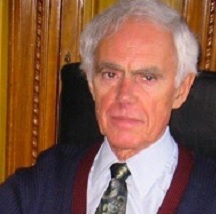Maurice Boutin was John W. McConnell Professor of Philosophy of Religion at McGill University, Montreal, from 1991 to 2010, and he taught Philosophical Theology at the University of Montreal from 1972 on. He received a State Ph.D. from the University of Munich, Germany, with a dissertation published in 1974 in the series “Beiträge zur evangelischen Theologie” with the title Relationalität als Verstehensprinzip bei Rudolf Bultmann (Munich: Chr. Kaiser Verlag –“Relationality as Understanding Principle in R. Bultmann’s Thought”). Since 1975, he is a member of the International Colloquiums on Hermeneutics (Rome, Italy) founded by Enrico Castelli. From 1981 to 1987, he has been President of the Canadian Corporation for Studies in Religion. He has published articles in German, French, Swiss, American, and Canadian journals and chapters in books in Germany, Italy, France, Canada, and the US. Since June 1st 2010, he is John W. McConnell Emeritus Professor of Philosophy of Religion, McGill University. Papers on his achievements given at a two-day symposium at McGill, which took place on November 12-13, 2010, have been edited under the direction of Jim Kanaris and published under the title Polyphonic Thinking and the Divine by Rodopi, Amsterdam & New York, in 2013. We invited him to answer the question “What is Philosophy of Religion?” as part of our “Philosophers of Religion on Philosophy of Religion” series.
The following three statements may lead to a new paradigm for philosophy of religion: (1) Human is fragile (with reference to Yves Ledure [1920-2012], Transcendances: Essai sur Dieu et le corps [Paris 1989]); (2) Human is fallible (with reference to Paul Ricoeur [2013-2005], Finitude and Guilt, the second volume [French 1960 & New York 1986] of Ricoeur’s Philosophy of Will), and (3) Human is finite. The latter directly challenges Ricoeur’s question “whether human transcendence is merely transcendence of finitude or whether the converse is not something of equal importance,” and thus also Ricoeur’s “working hypothesis concerning the paradox of the finite-infinite” whose full recognition – essential to the elaboration of the concept of fallibility according to Ricoeur – implies a moving from human finitude to infinitude, from perspective, desire, limited nature and death, to discourse, demand for totality, love and beatitude.
For Ricoeur, planet earth remains what it has been for so long: a place for corruption, limited movements and death, a place for great sub-lunar cemeteries, “the dark spot on the clear jacket of the sky” (Sloterdijk), which encourages at best a kind of private property on fascinating mysteries and provides the humiliation of all human beings, compared to a supra-terrestrial space practically out of reach for them. Ricoeur’s promise of “unlimited rationality” to which human being is no less destined goes along with what he calls “the sadness of the finite” nourished by primitive experiences expressing themselves negatively as lack, loss, dread, regret, deception, or dispersion.
Human being is finite, and human finitude is kept alert—not in check—through transcendence. To read divine transcendence into human finitude reminds us that a god who does not become human only enjoys at best a transcendence akin to the transcendence of ideas for which finitude can only be limitation. This has consequences on the approach to human rights and freedom. Usually, the freedom of others is seen as limitation of, and as virtual and even real threat to, my own freedom (you have rights—others also do; you are free—others also are). Considering others as a threat goes along with individualism, subjectivism and instrumentality, and ultimately a loss of freedom. Not to be taken for granted, let alone to be just defended or even imposed, my own freedom is enabled only through my actual engaging in the realization of the freedom of others. The later is not a limitation; it is not a virtual threat to my own freedom; it is its condition of possibility: I can be free only if I care for the freedom of others. Freedom emerges from the core of finitude itself; freedom is the basic dynamism of finitude provided that finitude ceases to be identified and thus confused with limitation. The mutual conditioning of personal freedom goes not from finitude as limitation (dependency) to the infinite, but from finitude to otherness.
Only a finite being can be a transcendent being. This is a point of departure, perhaps even a new paradigm for philosophy of religion, not just a matter of choosing a new accent or tone.

